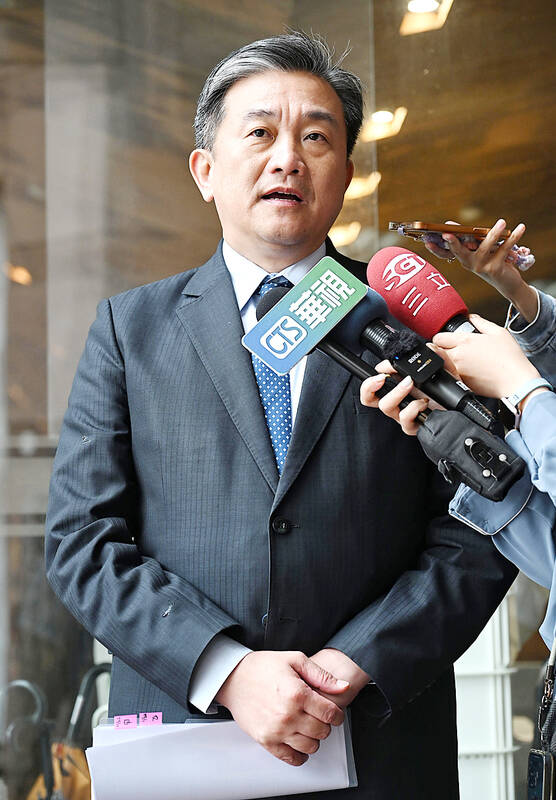Laws should be amended to counter Beijing’s psychological warfare against the armed forces, Democratic Progressive Party (DPP) Legislator Wang Ting-yu (王定宇) said on Sunday.
China has been enticing active and retired military personnel to help develop espionage organizations or to engage in psychological operations, such as by filming themselves “voluntarily” surrendering to China or signing a promise of their future surrender, he said.
Former army colonel Hsiang Te-en (向德恩) was recruited by retired lieutenant Shao Wei-chiang (邵維強) in October 2019 to work as a Chinese spy, receiving NT$40,000 (US$1,252) a month, which totaled NT$560,000 over 14 months. In January 2020, Hsiang signed a “pledge of surrender.”

Photo: Chang Chia-ming, Taipei Times
The Supreme Court sentenced Shao to 12 and a half years in prison and handed Hsiang a jail term of seven and a half years for corruption and bribery offences. The Disciplinary Court also removed Hsiang from office.
Hsiang said the sentence was unconstitutional and requested a constitutional interpretation, but his request was rejected.
The armed forces are tasked with defending national security, but Hsiang had contravened his legal duty by signing a pledge of surrender, promising to not only support cross-strait unification, but to also serve the Chinese government in case of a cross-strait war, the Constitutional Court said, citing the Supreme Court’s ruling.
The Constitutional Court said it decided not to review the case.
The Constitutional Court said that Hsiang’s argument, that signing the pledge was simply his personal opinion on cross-strait issues and that he had a right to freedom of expression, was not convincing.
In a separate case, eight current and retired military officers have been allegedly leaking classified military information to China since 2021.
Junior officers Lu Chun-fang (陸駿方) and Wu Chih-peng (吳志鵬) allegedly filmed themselves saying they would surrender to the Chinese People’s Liberation Army, while then-lieutenant colonel Hsieh Meng-shu (謝孟書) allegedly agreed to fly a Chinook helicopter to defect to China. The suspects also included retired army officer Chen Yu-hsin (陳裕炘), who has fled and is wanted.
They had jeopardized national security, the Supreme Court said, giving them prison terms ranging from one and a half years to 13 years for divulging military secrets, and contravening the National Security Act (國家安全法) and Anti-Corruption Act (貪污治罪條例).
The verdict can be appealed.
Commenting on the cases, Wang, who is also Foreign and National Defense Committee convener, said that Beijing intended to undermine the armed forces’ morale and Taiwanese’s trust in the military by making military personnel film themselves making remarks such as surrendering to China or promising to refrain from resistance in a time of war.
Such tactics are part of Chinese psychological operations targeting the armed forces to sap their morale, while those performed through Taiwanese celebrities are aimed at the public, DPP Legislator Puma Shen (沈伯洋) said.
It is difficult to curb the latter through regulations due to Taiwan’s respect for freedom of speech, he said, adding that boundaries can still be drawn.
For example, the government could refuse granting funding to artists and celebrities who have made pro-China statements, Shen added.

Chinese spouse and influencer Guan Guan’s (關關) residency permit has been revoked for repeatedly posting pro-China videos that threaten national security, the National Immigration Agency confirmed today. Guan Guan has said many controversial statements in her videos posted to Douyin (抖音), including “the red flag will soon be painted all over Taiwan” and “Taiwan is an inseparable part of China,” and expressing hope for expedited reunification. The agency last year received multiple reports alleging that Guan Guan had advocated for armed reunification. After verifying the reports, the agency last month issued a notice requiring her to appear and explain her actions. Guan

The Kaohsiung Tourism Bureau audited six hotels in an effort to prevent price gouging ahead of Korean band BTS’ concert tour in the city scheduled for Nov. 19, 21 and 22 this year. The bureau on Friday said that the audits — conducted in response to allegations of unfair pricing posted on social media — found no wrongdoing. These establishments included the local branches of Chateau de Chine, Hotel Nikko, My Humble House, and Grand Hai Lai, it said, adding that the Consumer Protection Commission would have penalized price gougers had the accusations been substantiated. The bureau said the Tourism Development Act

GIVE AND TAKE: Blood demand continues to rise each year, while fewer young donors are available due to the nation’s falling birthrate, a doctor said Blood donors can redeem points earned from donations to obtain limited edition Formosan black bear travel mugs, the Kaohsiung Blood Center said yesterday, as it announced a goal of stocking 20,000 units of blood prior to the Lunar New Year. The last month of the lunar year is National Blood Donation Month, when local centers seek to stockpile blood for use during the Lunar New Year holiday. The blood demand in southern Taiwan — including Tainan and Kaohsiung, as well as Chiayi, Pingtung, Penghu and Taitung counties — is about 2,000 units per day, the center said. The donation campaign aims to boost

BACK TO WINTER: A strong continental cold air mass would move south on Tuesday next week, bringing colder temperatures to northern and central Taiwan A tropical depression east of the Philippines could soon be upgraded to be the first tropical storm of this year, the Central Weather Administration (CWA) said yesterday, adding that the next cold air mass is forecast to arrive on Monday next week. CWA forecaster Cheng Jie-ren (鄭傑仁) said the first tropical depression of this year is over waters east of the Philippines, about 1,867km southeast of Oluanpi (鵝鑾鼻), and could strengthen into Tropical Storm Nokaen by early today. The system is moving slowly from northwest to north, and is expected to remain east of the Philippines with little chance of affecting Taiwan,